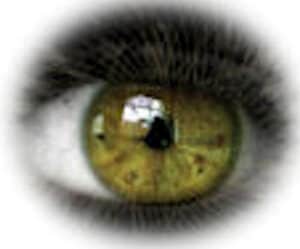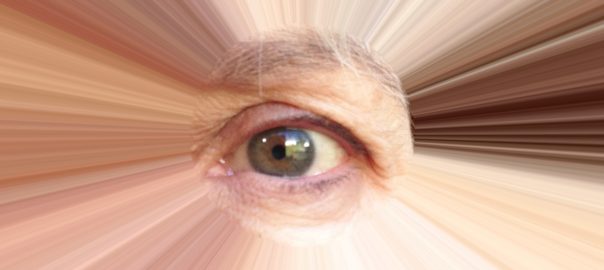The AREDS formula, lutein and zeaxanthin, and resveratrol stand out as the most recommended eye supplements for optimal eye health and the prevention and progression of AMD.
Patients are always asking which vitamin supplements should they be taking to insure they can maintain good vision into old age. I will discuss here several eye vitamin options. Keep in mind that needs vary by the individual, and their personal health status.
Always discuss supplementation options with your physician, before launching into a new vitamin regiment. What is appropriate for one individual may not be adequate for another.
Age-Related Eye Disease Study: AREDS and AREDS2 Formulas
Since the first study was released in 2001 (AREDS) and the second release in 2013 (AREDS 2), there has been much interest by doctors and patients regarding preservation of vision through supplementation.
What’s the difference?
| AREDS | AREDS 2 | |
| Vitamin C | 500 mg | 500 mg |
| Vitamin E | 400 IU | 4oo IU |
| Beta Carotene | 15 mg | 0 |
| Zinc (zinc oxide) | 80 mg | 25 mg |
| Copper | 2 mg | 2 mg |
| Lutein | 0 | 10 mg |
| zeaxanthin | 0 | 2 mg |
| Omega 3s | 0 | 350 mg DHA 650 mg EPA |
Other studies had indicated that lutein, zeaxanthin, and omega 3 fatty acids (DHA an EPA) also had an effect on AMD progression. Other questions arose around the use of beta-carotene and the high dose zinc used in the original study. For these reasons, the AREDS2 formula reflects these changes.
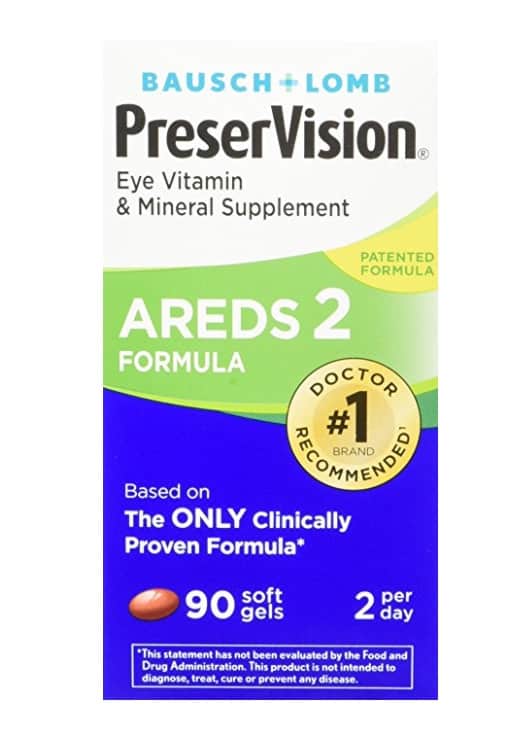
Who Should be taking an AREDS formula?
The study results show that those who benefit are:
1. Those with Intermediate AMD in one or both eyes, and
2. Those with Advanced, ‘wet’ or ‘dry’ AMD in one or both eyes.
So what that means is that neither AREDS 1 or AREDS 2 study did not find that taking the formula prevented the development of AMD, but was effective in halting the progression of the disease process in 25% of those individuals who already had vision loss secondary to macular degeneration. To put it another way, 1 out of 4 people with intermediate or advanced macular degeneration saw any benefits from the daily supplementation of the AREDS formula.
Supplements: Lutein, Zeaxanthin, and Meso-zeaxanthin
Lutein (L), zeaxanthin (Z), and meso-zeaxanthin (MZ) are xanthophyll carotenoids found in high concentration in the highly specialized macular area of the retina. The macular pigment protects the macula by filtering high energy visible light which can damage the underlying retinal pigment epithelium and photoreceptor cells. These carotenoids are also antioxidants which scavenge for free radicals to prevent oxidative stress of the highly metabolic macula.
Supplementing Lutein, zeaxanthin and mesozeaxanthin:
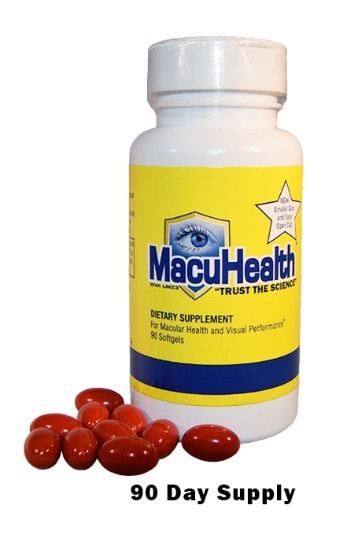
The three carotenoids can serve a preventative role. Studies have demonstrated that supplementing with these 3 carotenoids increases the macular pigment density and therefore are beneficial to increasing the protective macular pigment. These carotenoids have been shown to increase visual function by increasing contrast sensitivity. As there are no known negative side effects, aging adults benefit form increasing dietary carotenoids. Realizing this, and based on the studies of other researchers, you will note that the AREDS 2 formula incorporates lutein and zeaxanthin, which was not a part of the original study.
Dietary Sources of Lutein and zeaxanthin
AMD is the predominate cause of legal blindness in industrialized countries, like the U.S., U.K., Europe, and Australia. In developing countries, the number one cause is cataracts. Both of these diseases can be attributed to stress factors of aging, smoking, and poor nutrition, including the lack of dietary carotenoids.
According to an a Journal of Nutrients article , the sources of food with the highest lutein and zeaxanthin content are green leafy vegetables, (like kale, broccoli, spinach, peas, and lettuce) and egg yolks. While greens and egg yolks are high in these carotenoids, think colorful vegetables(corn, carrots, peppers), fruits, and even fish (salmon) as sources of these essential nutrients.
, the sources of food with the highest lutein and zeaxanthin content are green leafy vegetables, (like kale, broccoli, spinach, peas, and lettuce) and egg yolks. While greens and egg yolks are high in these carotenoids, think colorful vegetables(corn, carrots, peppers), fruits, and even fish (salmon) as sources of these essential nutrients.
Recommended Daily Intake of Lutein and Zeaxanthin
Research (JAMA article ) has shown that a typical US diet contains 1–3 mg/day of lutein and zeaxanthin. It has been studied and shown that approximately 6 mg/day have been related to decrease risk of AMD and cataract formation. Most of the commercially available L and Z supplements that I looked at have over 10 mg per capsule of each. While I prefer to get my nutrients from natural sources, food rich in carotenoids are lower than what is offered by supplementing. I could not find exact numbers, but it is like a pound or so of spinach or about 8 egg yolks. (Journal of Food
) has shown that a typical US diet contains 1–3 mg/day of lutein and zeaxanthin. It has been studied and shown that approximately 6 mg/day have been related to decrease risk of AMD and cataract formation. Most of the commercially available L and Z supplements that I looked at have over 10 mg per capsule of each. While I prefer to get my nutrients from natural sources, food rich in carotenoids are lower than what is offered by supplementing. I could not find exact numbers, but it is like a pound or so of spinach or about 8 egg yolks. (Journal of Food )
)
To learn more: Meso-zeaxanthin : The Third Carotenoid for Macular Health
Resveratrol
The health benefit claims of red wine can be attributed to the active component, resveratrol. Resveratrol is a polyphenol found in the skins of grapes that has powerful anti-oxidant and anti-inflammatory properties. Oxidative stress and inflammation are the underlying cause of eye disease and are responsible for its progression.
These destructive processes are responsible for age related eye disease such as macular degeneration, cataracts, glaucoma, and diabetic retinopathy. Resveratrol, as a supplement, has the potential to prevent and delay the progression of ocular disease.

Resveratrol and Eye Disease
Glaucoma: Studies have found that it may have a neuro-protective effect on the retinal ganglion cells which are the cells destroyed by the disease process of glaucoma.
Age Related Macular Degeneration: Research has shown that resveratrol has the potential to play a role in the prevention of AMD because it is an anti-oxidant and has the ability to inhibit cell death.
Diabetic Retinopathy: Researchers have found that supplementation with resveratrol reduces inflammation, oxidative stress, and suppress retinal and blood vessel changes associated with diabetic retinopathy .
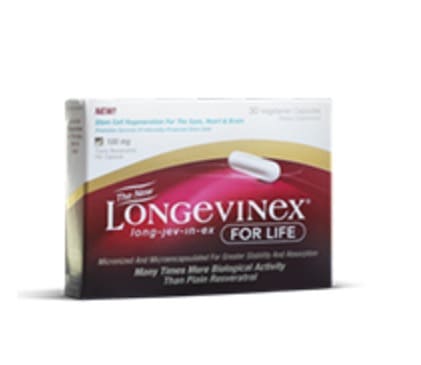
Who should be taking Resveratrol?
Fantastic claims are made regarding its health benefits: anti-cancer, anti-aging, immunity boasting, improves cardiovascular health, neuro-protective,, along with increased energy and endurance. So far, studies have found evidence that it has beneficial effects against the processes of disease, principally the oxidative stress and inflammation associated with the onset and progression of disease, including ocular disease.
There is no known side-effects or toxicity. Although it is generally well-tolerated except for nausea and diarrhea with high doses (5 g or greater). It is known that it inhibits platelet aggregation, so those on anti-coagulation and anti-platelet therapy would expect more bruising and bleeding. Also, be wary if taking anti-inflammatory like ibuprofen, aspirin, naproxen, and diclofenac. It is a good bet it should be discontinued before surgical procedures. Women who have estrogen sensitive cancers should avoid supplementation until more is known about its bioactivity.
For a more in-depth article on resveratrol see: Does Drinking Wine Help Prevent Eye Disease?
Learn about another supplement important for eye health: Do Omega-3 Supplements Help Your Eyes?
In the End…
Lutein, zeaxanthin, and meso-zeaxanthin play a important role in protecting the macula from harmful high-energy light and oxidative stress, both key factors in AMD progression. Studies have not only shown their ability to increase macular pigment density but also their positive impact on visual function, enhancing contrast sensitivity.
Moreover, the inclusion of lutein and zeaxanthin in the updated AREDS2 formula underscores their importance. As for resveratro as a supplement offers promising antioxidant and anti-inflammatory properties, potentially aiding in the prevention and delay of various eye diseases, from macular degeneration to cataracts and beyond.
For aging adults, increasing dietary carotenoids and considering supplements like resveratrol could be a proactive step in maintaining eye health. As research continues to shed light on these supplements’ benefits, it becomes clearer that they are not just adjuncts but essential components in the fight against age-related eye diseases.
The nutraceutical industry is unregulated. As with most supplements, more research and study is needed to better define its potential and its limitations as a nutritional supplement.
Other articles on eye supplements:
Anthocyanins of bilberry, blueberry, Maqui berry, and black currant
